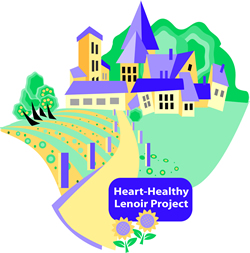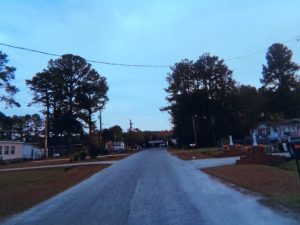 CHAPEL HILL-People in at-risk communities see heart health as more than just physical health and include psychological, spiritual and social health as well, according to research from UNC-Chapel Hill published today in Preventing Chronic Disease.
CHAPEL HILL-People in at-risk communities see heart health as more than just physical health and include psychological, spiritual and social health as well, according to research from UNC-Chapel Hill published today in Preventing Chronic Disease.
Researchers with the Heart Healthy Lenoir study worked with two groups of African-American residents of Lenoir County, in eastern NC, adults and youth, to explore barriers to heart health. They used the photovoice method, a research process that provides cameras to participants to take photographs of the environment to illustrate and understand the factors influencing health issues. The participants selected topics for each session, took photographs to show their perspectives, and then came together to discuss causes and potential solutions to improve health in their community.
The photos and discussions showed that participants thought of heart health as an issue affected by many factors, especially food availability (both healthy and unhealthy) and stress. Participants also talked about personal responsibility for heart health, related to making healthy choices, and the importance of social support from friends and family to make those healthy changes. See a slideshow of selected study photographs here.

“The project really illustrated how community members feel about cardiovascular health,” said Sarah Kowitt, a doctoral student in health behavior at the UNC Gillings School of Global Public Health who led the analysis of the photovoice results. “People clearly recognized heart disease was a problem and were actively trying to improve their health, but they also reported facing a number of structural barriers, such as unhealthy food environments. The great thing about photovoice is that, in addition to barriers, the approach identifies assets in communities that can be harnessed for health promotion.”
The group included 9 adolescents and 6 adults who live in and around Lenoir County, which has some of the highest rates of death from heart disease in the country, particularly among low income and minority individuals. The adults in the study talked about being good role models for youth, and the adolescents looked to family members when talking about good role models for healthy lifestyle choices. The adults also discussed faith as integral to helping themselves and adolescents find a purpose for prioritizing their health.
The photovoice project was part of formative research establishing a community partnership with Lenoir County residents as part of the Heart Healthy Lenoir study, a 5-year study designed to develop and test better ways to reduce heart disease in Lenoir County. Heart Healthy Lenoir was based at the UNC Center for Health Promotion and Disease Prevention (HPDP) and funded by the National Heart, Lung and Blood and Institute and led by Alice Ammerman, director of HPDP and professor of nutrition at the School of Public Health.
The photovoice study research team was led by Alexandra Lightfoot, director of HPDP’s community engagement core and research assistant professor in the department of health behavior. The team also included co-investigators in the study, postdoc and graduate students, and community partners who live in Lenoir County.
“This formative work using photovoice provided a critical basis for the design of clinical and community-based programs to reduce the risk of heart disease,” Lightfoot said. “By tailoring programs like this to the specific concerns and needs of the community, the chances of success are much greater. ”
UNC News Contact:
MC VanGraafeiland
UNC-Chapel Hill, Office of Communications and Public Affairs
919-962-7090
UNC Center for Health Promotion and Disease Prevention Contact:
Sonya Sutton
919-966-4118
